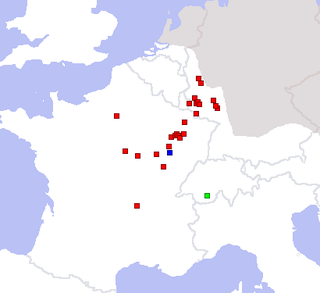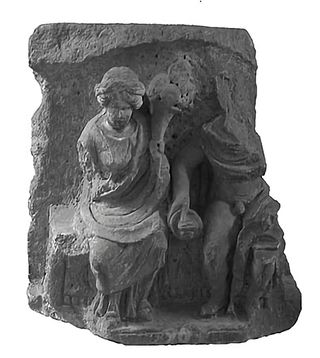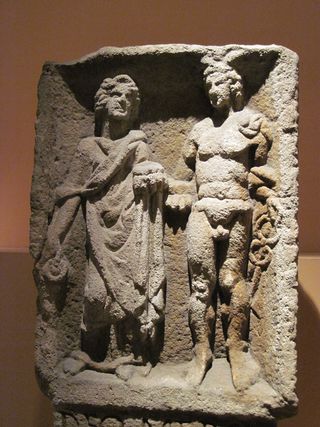「ロスメルタ」の版間の差分
(→碑文) |
(→碑文) |
||
| 19行目: | 19行目: | ||
ジュファー(Jufer)とルギンビュール(Luginbühl)は27のロスメルタ碑文を挙げ<ref>Jufer, Luginbühl, 2001, page60</ref>、それはフランス、ドイツ、ルクセンブルクに分布し、主にローマのガリア・ベルギカとゲルマニア上州に相当する地域であった。さらに2つの碑文が知られており、1つはローマ時代のダキアのものである<ref>AE, 1998, 1100</ref>。 | ジュファー(Jufer)とルギンビュール(Luginbühl)は27のロスメルタ碑文を挙げ<ref>Jufer, Luginbühl, 2001, page60</ref>、それはフランス、ドイツ、ルクセンブルクに分布し、主にローマのガリア・ベルギカとゲルマニア上州に相当する地域であった。さらに2つの碑文が知られており、1つはローマ時代のダキアのものである<ref>AE, 1998, 1100</ref>。 | ||
| + | メッツの碑文<ref>CIL, 13, 4311</ref>は、ロスメルタとメルクリウスに共同で奉納(votum)されたものである。 | ||
| − | An inscription from [[Metz]] | + | |
| + | An inscription from [[Metz]] is a dedication ''([[votum]])'' to Mercury and Rosmerta jointly. Another from Eisenberg was made by a [[Decurion (Roman cavalry officer)|decurion]] in fulfillment of a vow to the couple jointly.<ref>''Deo Mercu(rio) / et Rosmer(tae) / M(arcus) Adiuto/rius Mem/{m}or d(ecurio) c(ivitatis) St() / [po]s(uit) l(ibens) m(erito)'' ("Marcus Adiutorius Memor, a decurion of the ''civitas'' St… has deposited [this votive] willingly, as is deserved"). The name of the ''civitas'', the Celtic community, is presumably obscured. The latter phrase is a variation on the standard ''votum solvit libens merito'', in which the person making the dedication declares that he "has released his vow willingly, as is deserved," often abbreviated as V.S.L.M.</ref> | ||
In two inscriptions<ref>{{CIL|13|4683}} and {{CIL|13|4705}}.</ref> both from Gallia Belgica, Rosmerta is given the epithet ''[[Glossary of ancient Roman religion#sacer|sacra]]'', sacred. A lengthier inscription from [[Wasserbillig]] in Gallia Belgica<ref>{{CIL|13|4208}}</ref> associates the divine couple with the dedication of a shrine ''([[Aedes (Roman religion)|aedes]])'', with "hospitable" rites to be celebrated.<ref>''Deo Mercurio [et deae Ros]/mertae aedem c[um signis orna]/mentisque omn[ibus fecit] / Acceptus tabul[arius VIvir] / Augustal[is donavit?] / item hospitalia [sacror(um) cele]/brandorum gr[atia pro se libe]/risque suis ded[icavit 3] / Iulias Lupo [et Maximo co(n)s(ulibus)]''.</ref> | In two inscriptions<ref>{{CIL|13|4683}} and {{CIL|13|4705}}.</ref> both from Gallia Belgica, Rosmerta is given the epithet ''[[Glossary of ancient Roman religion#sacer|sacra]]'', sacred. A lengthier inscription from [[Wasserbillig]] in Gallia Belgica<ref>{{CIL|13|4208}}</ref> associates the divine couple with the dedication of a shrine ''([[Aedes (Roman religion)|aedes]])'', with "hospitable" rites to be celebrated.<ref>''Deo Mercurio [et deae Ros]/mertae aedem c[um signis orna]/mentisque omn[ibus fecit] / Acceptus tabul[arius VIvir] / Augustal[is donavit?] / item hospitalia [sacror(um) cele]/brandorum gr[atia pro se libe]/risque suis ded[icavit 3] / Iulias Lupo [et Maximo co(n)s(ulibus)]''.</ref> | ||
2022年11月25日 (金) 23:02時点における版
ガロ・ローマ時代の宗教では、ロスメルタ(Rosmerta)は豊穣と豊穣の女神であり、その属性はコルヌコピアなどの豊穣のものであった。ロスメルタは、彫像や碑文によって存在を証明されている。ガリアでは、彼女はローマの神メルクリウスとともに描かれることが多かったが、単独で描かれることもある。
語源
ロスメルタという名前はガリア語で、ro-smert-aと分析される。Smertは「提供者」「世話役」を意味し、Ad-smerio, Smertu-litani, Smerius (Σμερο), Smertae, Smertusなど、ガリア人の名前にも見られる[1]。Ro-はRo-bili(「最も良い」)やRo-cabalus(「偉大な馬」)に見られるように、「非常に」「偉大な」「最も」という意味の修飾語である[2]。語尾の-aは典型的なガリア語の女性単数主格である。つまり、「偉大なる供給者」という意味である。
図像
オータン(古代ケルト人の首都アウグストドゥヌム[3])のレリーフには、ロスメルタとメルクリウスがカップルとして一緒に座っている様子が描かれている。ロスメルタはコルヌコピアを持ち、その左側にはパテラを持ったメルクリウスがいる。
アイゼンベルクの浅浮彫り[4]には、同じように相対的な位置にいるカップルが描かれており、碑文によってロスメルタが明確に特定されている[5]。ロスメルタは右手に財布、左手にパテラを持っている。
パリにある夫婦像では、ロスメルタがコルヌコピアと果物の入ったバスケットを手にしている。
ファン・ダナンシー(オート=サヴォワ県)のブロンズ像には、ロスメルタがひとりで描かれており、岩の上に座って財布を持ち、珍しく頭にはマーキュリーの翼をつけている。エスコリーヴ・サント・カミーユの石の浅浮彫り[6]には、パテラとコルヌコピアを持つロスメルタの姿が描かれている。
碑文
ジュファー(Jufer)とルギンビュール(Luginbühl)は27のロスメルタ碑文を挙げ[7]、それはフランス、ドイツ、ルクセンブルクに分布し、主にローマのガリア・ベルギカとゲルマニア上州に相当する地域であった。さらに2つの碑文が知られており、1つはローマ時代のダキアのものである[8]。
メッツの碑文[9]は、ロスメルタとメルクリウスに共同で奉納(votum)されたものである。
An inscription from Metz is a dedication (votum) to Mercury and Rosmerta jointly. Another from Eisenberg was made by a decurion in fulfillment of a vow to the couple jointly.[10]
In two inscriptions[11] both from Gallia Belgica, Rosmerta is given the epithet sacra, sacred. A lengthier inscription from Wasserbillig in Gallia Belgica[12] associates the divine couple with the dedication of a shrine (aedes), with "hospitable" rites to be celebrated.[13]
References
- Année Epigraphique volumes 1967, 1987, 1998
- Corpus Inscriptionum Latinarum (CIL), volume 13, Tres Galliae ("The Three Gauls")
- テンプレート:Cite book
- テンプレート:Cite book
- テンプレート:Cite book
関連項目
参照
- ↑ Delamarre, 2003, page277
- ↑ Delamarre, 2003, pages261–262
- ↑ 現在のフランスの都市
- ↑ Deyts, 1992, page119
- ↑ AE, 1905, 58
- ↑ Deyts, 1992, pages120–121
- ↑ Jufer, Luginbühl, 2001, page60
- ↑ AE, 1998, 1100
- ↑ CIL, 13, 4311
- ↑ Deo Mercu(rio) / et Rosmer(tae) / M(arcus) Adiuto/rius Mem/{m}or d(ecurio) c(ivitatis) St() / [po]s(uit) l(ibens) m(erito) ("Marcus Adiutorius Memor, a decurion of the civitas St… has deposited [this votive] willingly, as is deserved"). The name of the civitas, the Celtic community, is presumably obscured. The latter phrase is a variation on the standard votum solvit libens merito, in which the person making the dedication declares that he "has released his vow willingly, as is deserved," often abbreviated as V.S.L.M.
- ↑ テンプレート:CIL and テンプレート:CIL.
- ↑ テンプレート:CIL
- ↑ Deo Mercurio [et deae Ros]/mertae aedem c[um signis orna]/mentisque omn[ibus fecit] / Acceptus tabul[arius VIvir] / Augustal[is donavit?] / item hospitalia [sacror(um) cele]/brandorum gr[atia pro se libe]/risque suis ded[icavit 3] / Iulias Lupo [et Maximo co(n)s(ulibus)].


